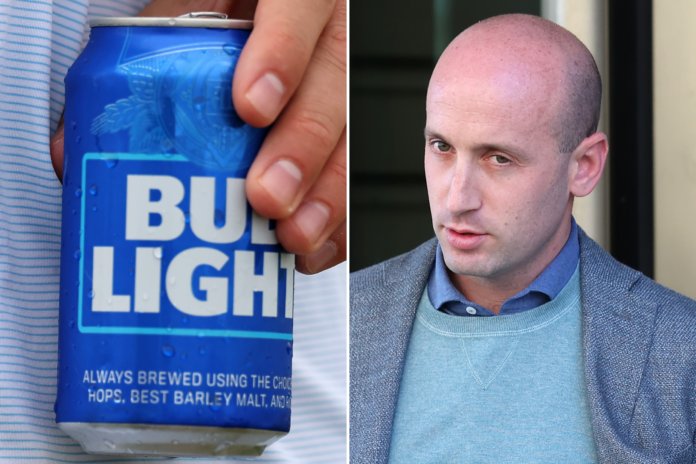A former top advisor to former President Donald Trump is gearing up to sue Bud Light’s parent company (as well as a number of other brands) for allegedly tanking their shareholder value through the marketing of LGBTQ-inclusive merchandise and promos amid a large-scale conservative boycott of any brands who show public support to the community, but one expert told Newsweek why it may not work.
On Tuesday, America First Legal—an activist conservative law firm founded by former Trump adviser Stephen Miller—published an open call for anyone whose shares in companies like Kohl’s, Anheuser-Busch, Target or any other LGBTQ-friendly company lost value to reach out to them to join a class action lawsuit they potentially hoped to file against the companies.
“ATTENTION: Are you a shareholder of @Target, @Kohls, @abinbev, or other companies that are promoting transgender, LGBTQ and PRIDE products and diminishing shareholder value?” the post asked with a link to the organization’s email address. “We want to hear from you.”
ATTENTION: Are you a shareholder of @Target @Kohls @abinbev, or other companies that are promoting transgender, LGBTQ and PRIDE products and diminishing shareholder value?
We want to hear from you: [email protected] https://t.co/mEbMWPp8jk
— America First Legal (@America1stLegal) May 30, 2023
Newsweek has reached out to America First Legal as well as all three named companies via email for comment.
The effort, should it come to fruition, would represent another act of lawfare against the embattled Bud Light brand, which recently fell against Congressional scrutiny for allegedly violating rules regulating advertisers of alcoholic beverages after a one-off promotion it did with transgender social media influencer Dylan Mulvaney in late March.
Meanwhile, stock prices have taken a nosedive.
Anheuser-Busch—currently enduring a weeks-long boycott over the Mulvaney incident despite a longstanding history of LGBTQ inclusive advertising—has lost approximately 15 percent of its per-share value over the last month while Target, currently facing boycott calls for stocking merchandise celebrating Pride Month in recent days, has seen a more than 10 percent drop in its share price over the last five days.
Kevin Dietsch/Rob Carr/Newsweek Photo Illustration/Getty Images
Kohls, meanwhile, attracted boycott calls from conservatives over the weekend after it was found they had begun carrying Pride-related merchandise, particularly a set of pajamas for infants acknowledging the LGBTQ community exists.
The fury has even spread to privately owned companies like Chick-Fil-A, which attracted scorn over the weekend from some conservatives over its inclusion of a commitment to diversity, equity and inclusion initiatives on its website, all despite a longstanding reputation of company executives’ hostility toward the LGBTQ community.
We have a problem.
Chick-Fil-A just hired a VP of Diversity, Equity and Inclusion.
This is bad. Very bad.
I don’t want to have to boycott.
Are we going to have to boycott?
— Joey Mannarino (@JoeyMannarinoUS) May 30, 2023
Whether Miller’s strategy to sue the companies will be successful, however, is another question.
The strategy America First Legal appears to be weighing is commonly referred to in the legal community as a “Stock-Drop Lawsuit.” The practice, first emergent in the 1930s, came at a time the federal government began to require publicly traded companies to publicize their financial information, therefore allowing shareholders to dispute that information’s accuracy—or the company’s aversion to sharing bad news about their company’s financial future—through litigation.
However, at the end of the 20th Century, Congress passed legislation in an attempt to curb frivolous lawsuits against companies that perform poorly on the stock market, leaving disgruntled investors with a higher burden of proof to meet in order to successfully sue.
That’s oftentimes the reason why such lawsuits are rare: during 2020’s hot stock market, for example, the number of so-called “stock drop” cases fell from 402 in 2019 to just 210 according to a January 2022 article by Law.com, largely due to the fact fewer companies were seeing losses.
But more recent cases, like one 2014 U.S. Supreme Court ruling in a securities fraud case involving energy giants Halliburton, could have potentially lowered the threshold for successful suits to make it through, dissidents on the court noted, with conservative Justice Clarence Thomas arguing the decision would lower the burden of proof litigants would need to accuse companies of dereliction their fiduciary duties ahead of a drop in stock price.
In plain English: To be successful, America First Legal would likely need to prove the companies involved in the suit moved forward with LGBTQ-inclusive marketing initiatives with the advanced knowledge it would hurt their share price.
And given that pro-LGBTQ brands generally proved popular prior to the boycott, according to public opinion polling, that could be a high threshold to meet.
“Whether it’s a direct action by a shareholder or a derivative suit on behalf of the corporation, the plaintiffs will need to prove negligence, breach of a fiduciary duty, or some other basis for liability,” Neama Rahmani, a former federal prosecutor, told Newsweek in an email. “It’s a stretch to argue that the officers and directors violated the standard of care by moving forward with inclusive LGBTQ marketing strategies. I can see a judge dismissing this type of lawsuit at the pleading phase if a lawyer tries to move forward.”


